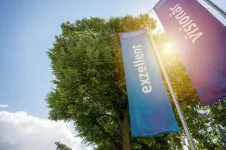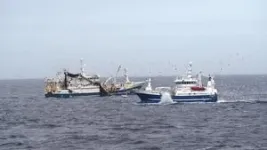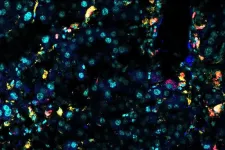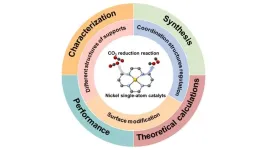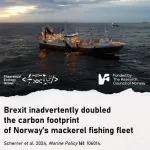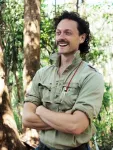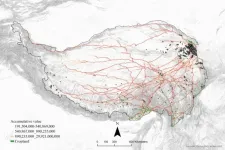(Press-News.org) As a result, TUD ranks second overall in the number of calls for proposals in the current competition nationwide. This is according to today’s joint announcement (February 2, 2024) by the German Research Foundation (DFG) and the German Science and Humanities Council (WR). An international panel of experts appointed by the DFG and the WR through the Joint Science Conference (GWK) has assessed a total of 143 draft proposals over the last few days and selected 41 as valuable funding opportunities.
In addition, TUD's three existing Clusters of Excellence have expressed their intent to the DFG that they wish to continue their outstanding research work. TUD, therefore, enters the next round of Cluster of Excellence evaluations with three already existing and three new Clusters of Excellence.
Prof. Ursula Staudinger, Rector of TU Dresden:
“The fact that three of TUD’s Cluster of Excellence initiatives were invited to submit full proposals by the DFG and the German Science and Humanities Council and that TUD thus ranks second in this phase of the Excellence Strategy emphatically underlines our exceptional performance as a top research university and the extraordinary innovation of the researchers at TUD and the DRESDEN-concept alliance. I am particularly pleased that the proposed projects focus on areas of research that will help solve the pressing problems of our future, such as climate change. This is a decisive step on our way to permanently positioning TUD as a University of Excellence and thus to further developing it as a top university for the 21st century. My warmest congratulations to all the colleagues involved."
Prof. Angela Rösen-Wolff, Vice-Rector Research at TU Dresden:
“TU Dresden is one of the top universities in Germany, as this fantastic success shows. With their focus on important future issues and innovative research fields such as research into the functions of the brain for machine learning, resource-efficient construction, and sustainable high-performance electronics, the three TUD Clusters of Excellence initiatives invited to submit full proposals align with TUD's aspirations to develop solutions for the pressing issues of the 21st century."
Sebastian Gemkow, Minister of Science of the Free State of Saxony:
“I would like to congratulate TU Dresden on this tremendous success; to have three pioneering research projects rated so highly is a testament to the university's exceptional performance. The State Government will do everything in its power to support the applicants and the universities as they progress in the Excellence Strategy competition.”
By August 22, 2024, TU Dresden will submit a full proposal for the following Cluster of Excellence initiatives for the 2026 to 2032 funding phase:
BiC Behavior in Context: Brain and Machine Computations of Behavior in Complex and Uncertain Environments.
CARE Climate-Neutral and Resource-Efficient Construction (with RWTH Aachen)
REC2: Responsible Electronics in the Climate Change Era”
A brief portrait of the three new Cluster of Excellence Initiatives
BiC - Behavior in Context: Brain and Machine Computations of Behavior in Complex and Uncertain Environments.
Speaker: Prof. Stefan Kiebel
The human brain controls behavior in complex situations, such as when communicating with others or when driving. Despite years of research, AI systems just can’t keep up in terms of efficiency. The BiC Cluster of Excellence wants to investigate whether recently discovered brain mechanisms represent key principles and can be transferred to machine learning and the development of therapies.
CARE - Climate-Neutral and Resource-Efficient Construction
Speaker: Prof. Viktor Mechtcherine (TUD) and Prof. Martin Claßen (RWTH Aachen)
Conventional concrete and cement make up 80% of the materials used in construction and are responsible for more than 8% of global CO2 emissions during production. The CARE Cluster of Excellence at TU Dresden and RWTH Aachen University aims to use climate-friendly building materials, construction principles and production technologies to achieve the goal of sustainable construction in every aspect.
REC2 - Responsible Electronics in the Climate Change Era
Speaker: Prof. Yana Vaynzof
Electronics bring many benefits to our lives, but at a cost of enormous resource and energy consumption and generation of e-waste. The REC² cluster is creating the scientific basis for the electronics of the future: new material platforms, device concepts and integrated systems with which responsible electronics can be realized in an ecologically, economically and societally sustainable way.
Letters of intent submitted: Established Clusters of Excellence submit innovative approaches for additional funding
In addition to the new Cluster Initiatives that have been invited to submit full proposals, the three Clusters of Excellence CeTI: Centre for Tactile Internet with Human-in-the-Loop, ct.qmat: Complexity and Topology in Quantum Matter, and PoL: Physics of Life are already being funded at TU Dresden. All three Clusters intend to continue their excellent research in the fields of communication networks, quantum materials, and the physics of life. To this end, they submitted their letters of intent to the DFG and the WR by the stipulated deadline of January 29, 2024 – together with a description of how they will continue to innovatively develop their research areas on the basis of their experience and results.
CeTI: Center for Tactile Internet with Human-in-the-Loop
Speaker: Prof. Frank Fitzek
CeTI will continue its successful interdisciplinary research in the field of communication networks and promote the transfer of human senses to robotics and the metaverse. The second phase will integrate new approaches from quantum technology and biology with a view to improving energy efficiency and trustworthiness in virtual worlds. A key objective is to make this technology as accessible as possible so that as many people as possible can benefit from it.
More information: https://ceti.one
ct.qmat: Complexity and Topology in Quantum Matter
Speaker: Prof. Matthias Vojta (TUD) and Prof. Ralph Claessen (Uni Würzburg)
The competition for quantum technologies is well underway. Materials that exhibit exotic phenomena play a crucial role in this respect. The ct.qmat Cluster of Excellence is researching quantum materials that will be able to conduct electricity without loss and store huge amounts of information. They reveal their exotic phenomena under extreme conditions. One of the major goals of the second funding period is to make these special properties usable under everyday conditions and thus suitable for use in revolutionary technical applications.
More information: https://www.ctqmat.de
PoL: Physics of Life
Speaker: Prof. Otger Campàs
The “Physics of Life” Cluster of Excellence will pursue its research at the interface between biology and physics with the aim of uncovering the physical principles underlying the dynamic organization of life. This understanding will transform the link between physics and biology, reshape the life sciences, and help humanity find solutions to some of the world's most pressing biotechnological and health problems.
More information: https://physics-of-life.tu-dresden.de
TU Dresden
TUD Dresden University of Technology, as a University of Excellence, is one of the leading and most dynamic research institutions in Germany. With around 8,300 members of staff and around 29,000 students in 17 Faculties, it is one of Europe’s largest technically-oriented universities. Founded in 1828, today it is a globally oriented, regionally anchored top university, developing innovative solutions for the world's most pressing issues. In research and academic programs, the university unites the natural and engineering sciences with the humanities, social sciences and medicine. This wide range of disciplines is an outstanding feature that facilitates interdisciplinarity and transfer of science to society.
END
Outstanding success in the Excellence Strategy: TU Dresden enters the next round with three new Clusters of Excellence initiatives
2024-02-02
ELSE PRESS RELEASES FROM THIS DATE:
HMSOM researchers: Data shows clinical trials becoming more inclusive
2024-02-02
Clinical trials and medical research have been historically lacking in diversity among all groups.
But recent trends have been turning the tide at least a little bit toward equity and inclusivity, according to a new meta-analysis published by a team of investigators from the Hackensack Meridian School of Medicine (HMSOM) and the Hackensack Meridian Health Research Institute (HMHRI).
The meta-analysis of clinical trials which included New Jersey patients from 2017 to 2022 show a snapshot of more diverse representation - and better reporting of race and ethnicity factors, according to the new paper in the Elsevier ...
CAR T cells show promise against age-related diseases in mice
2024-02-02
Highlights
Laboratory research led by MSK and Cold Spring Harbor Laboratory demonstrates the potential for CAR T cells to improve “healthspan” by eliminating senescent cells associated with aging-related diseases.
Not only was the treatment able to improve the metabolic function of aging mice and mice fed a high-fat diet, but it also proved protective against metabolic decline when given to younger mice.
The CAR T cell-based approach offers a powerful alternative to more traditional small-molecule drugs target senescent cells, supported by its long-lasting effects and the potential to fine-tune ...
Clinique partners with Icahn School of Medicine at Mount Sinai to establish the Mount Sinai-Clinique Healthy Skin Dermatology Center
2024-02-02
New York, NY (February 2, 2024) – Clinique and Icahn School of Medicine at Mount Sinai today announced a philanthropic partnership to establish the Mount Sinai-Clinique Healthy Skin Dermatology Center. The Center will develop forward-thinking research in dermatology, exploring the biological underpinnings of how skin ages, skin allergies and inflammatory or eczematous skin conditions, including eczema (or atopic dermatitis) and contact dermatitis. Rooted in a shared mission to conduct dermatological research that improves patients’ lives, the partnership will focus on applicable scientific discovery and leading-edge innovation to modernize allergy science in order to ...
Strategies for enhancing the performance of nickel single-atom catalysts for the electroreduction of CO2 to CO
2024-02-02
Electrocatalytic reduction of carbon dioxide (CO2) is considered as an effective strategy for mitigating the energy crisis and the greenhouse effect. Among the multiple reduction products, CO is regarded as having the highest market value as it is a crucial feedstock for Fischer-Tropsch process which can synthesize high-value long-chain hydrocarbons. Since the carbon dioxide reduction reaction (CO2RR) has complex intermediates and multiple proton-coupled electron transfer processes, improving the reaction activity and products selectivity remain two great challenges.
Single-atom catalysts (SACs) have the advantages of high atom utilization, tunable coordination structure ...
Brexit-induced spatial restrictions reveal alarming increase of fishing fleet’s carbon footprint
2024-02-02
In a study published today in Marine Policy, researchers have unveiled striking evidence that fisheries management decisions such as spatial fisheries restrictions can increase greenhouse gas emissions. The study, conducted by a team of scientists led by postdoctoral researcher Kim Scherrer at the University of Bergen, sheds light on the unforeseen consequences of policy changes on fishing fleets and their carbon footprint.
In the North Atlantic, international agreements often allow fleets to follow the fish across national borders. This allows fishers to catch the fish where it is most efficient. But when the UK left the EU (Brexit), ...
Scammed! Animals ‘led by the nose’ to leave plants alone
2024-02-02
University of Sydney researchers have shown it is possible to shield plants from the hungry maws of herbivorous mammals by fooling them with the smell of a variety they typically avoid.
Findings from the study published in Nature Ecology & Evolution show tree seedlings planted next to the decoy smell solution were 20 times less likely to be eaten by animals.
“This is equivalent to the seedlings being surrounded by actual plants that are unpalatable to the herbivore. In most cases it does trick the animals into leaving the plants alone,” said PhD student Patrick ...
Why are people climate change deniers?
2024-02-02
Do climate change deniers bend the facts to avoid having to modify their environmentally harmful behavior? Researchers from the University of Bonn and the Institute of Labor Economics (IZA) ran an online experiment involving 4,000 US adults, and found no evidence to support this idea. The authors of the study were themselves surprised by the results. Whether they are good or bad news for the fight against global heating remains to be seen. The study is being published in the journal Nature Climate Change. STRICTLY EMBARGOED: Do not publish before Friday, February 02, 11 a.m. CET!
A surprisingly large number of people ...
Epigenetic status determines metastasis
2024-02-02
Scientists from the German Cancer Research Center (DKFZ) and Heidelberg University investigated in mice how spreading tumor cells behave at the site of metastasis: Some tumor cells immediately start to form metastases. Others leave the blood vessel and may then enter a long period of dormancy. What determines which path the cancer cells take is their epigenetic status. This was also confirmed in experiments with human tumor cells. The results of the study could pave the way for novel diagnostic and therapeutic applications.
What makes cancer so dangerous? ...
Prehistoric mobility among Tibetan farmers, herders shaped highland settlement patterns, cultural interaction, study finds
2024-02-02
The 1 million-square-mile Tibetan Plateau — often called the “roof of the world” — is the highest landmass in the world, averaging 14,000 feet in altitude. Despite the extreme environment, humans have been permanent inhabitants there since prehistoric times.
Farming and herding play major roles in the economy of the Tibetan Plateau today — as they have throughout history. To make the most of a difficult environment, farmers, agropastoralists and mobile herders interact and move in conjunction with one another, which in turn shapes ...
World Wetlands Day: Bogs hold an important key to the climate crisis
2024-02-02
World Wetlands Day: Bogs hold an important key to the climate crisis
Peat bogs store twice as much CO2 as all of the world's forests combined. A new research center at the University of Copenhagen will map Earth’s wetlands and provide important knowledge about the greenhouse gas budgets of these areas. The Global Wetland Center will teach us how to contain carbon from plants and trees in bogs and other wetlands – and preserve it as well as the ancient bog bodies also found there.
He is world-renowned ...
